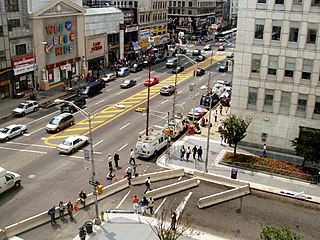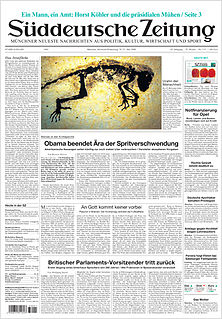Related Research Articles
The mass media in Romania refers to mass media outlets based in Romania. Television, magazines, and newspapers are all operated by both state-owned and for-profit corporations which depend on advertising, subscription, and other sales-related revenues. The Constitution of Romania guarantees freedom of speech. As a country in transition, the Romanian media system is under transformation.

The Economist is a British weekly newspaper printed in demitab format and published digitally that focuses on current affairs, international business, politics, technology, and culture. Based in London, the newspaper is owned by The Economist Group, with core editorial offices in the United States, as well as across major cities in continental Europe, Asia, and the Middle East. In 2019, its average global print circulation was over 909,476; this, combined with its digital presence, runs to over 1.6 million. Across its social media platforms, it reaches an audience of 35 million, as of 2016. The newspaper has a prominent focus on data journalism and analysis over original reporting, to both criticism and acclaim.
Independent or Independents may refer to:

The news media or news industry are forms of mass media that focus on delivering news to the general public or a target public. These include print media, broadcast news, and the Internet.
The mass media in Sweden has a long tradition going back to the 1766 law enacting freedom of the press.
Sports journalism is a form of writing that reports on matters pertaining to sporting topics and competitions. Sports journalism started in the early 1800s when it was targeted to the social elite and transitioned into an integral part of the news business with newspapers having dedicated sports sections. The increased popularity of sports amongst the middle and lower class led to the more coverage of sports content in publications. The appetite for sports resulted in sports-only media such as Sports Illustrated and ESPN. There are many different forms of sports journalism, ranging from play-by-play and game recaps to analysis and investigative journalism on important developments in the sport. Technology and the internet age has massively changed the sports journalism space as it is struggling with the same problems that the broader category of print journalism is struggling with, mainly not being able to cover costs due to falling subscriptions. New forms of internet blogging and tweeting in the current millennium have pushed the boundaries of sports journalism.

The San Diego Union-Tribune is a metropolitan daily newspaper published in San Diego, California, that has run since 1868.
There are several different types of mass media in the United Kingdom: television, radio, newspapers, magazines and websites. The United Kingdom is known for its large music industry, along with its new and upcoming artists. The country also has a large broadcasting and film industry.
In journalism, local news refers to coverage of events, by the news, in a local context that would not be an interest of another locality, or otherwise be of national or international scope. Local news, in contrast to national or international news, caters to the news of their regional and local communities; they focus on more localized issues and events. Some key features of local newsrooms includes regional politics, weather, business, and human interest stories. Local news readership has been declining in recent years, according to a recent study. And as more and more television consumers tap into streamed programming, local news viewership is beginning to decline. Nikki Usher, an associate professor at the College of Media at the University of Illinois, argued in The Complicated Future of Local News that "critical and comprehensive local news is a recent invention, not a core element of the history of American democracy.”
The Huddersfield Daily Examiner is an English local daily evening newspaper covering news and sport from Huddersfield and its surrounding areas.

The Indypendent is a progressive newspaper based in Brooklyn, New York. It is published monthly, distributed worldwide and is available for free throughout New York City and online. It currently prints 30,000 copies per issue, covering local, national and international news, food, cinema and culture. Reader donations comprise the bulk of The Indypendent's funding.

Self-managed social centres in the United Kingdom can be found in squatted, rented, mortgaged and fully owned buildings. These self-managed social centres differ from community centres in that they are self-organised under anti-authoritarian principles and volunteer-run, without any assistance from the state. The largest number have occurred in London from the 1980s onwards, although projects exist in most cities across the UK, linked in a network. Squatted social centres tend to be quickly evicted and therefore some projects deliberately choose a short-term existence, such as A-Spire in Leeds or the Okasional Café in Manchester. Longer term social centres include the 1 in 12 Club in Bradford, the Cowley Club in Brighton and the Sumac Centre in Nottingham, which are co-operatively owned.

The media in Wales provide services in both English and Welsh, and play a role in modern Welsh culture. BBC Wales began broadcasting in 1923 have helped to promote a form of standardised spoken Welsh, and one historian has argued that the concept of Wales as a single national entity owes much to modern broadcasting. The national broadcasters are based in the capital, Cardiff.
Southport Reporter is an online newspaper started by Patrick Trollope. It was the UK's first online-only regional newspaper. It is based in Southport on Merseyside, and was quickly recognised by the National Union of Journalists as well as other media groups, authorities and organizations as a newspaper. This recognition was due to the fact it was only run by certificated professional journalists. As a result, they had to follow and run under the rules of the UK Press Complaints Commission's Code of Practice and the NUJ Code of Conduct.

A paywall is a method of restricting access to content, with a purchase or a paid subscription, especially news. Beginning in the mid-2010s, newspapers started implementing paywalls on their websites as a way to increase revenue after years of decline in paid print readership and advertising revenue, partly due to the use of ad blockers. In academics, research papers are often subject to a paywall and are available via academic libraries that subscribe.

The Guardian is a British daily newspaper. It was founded in 1821 as The Manchester Guardian, and changed its name in 1959. Along with its sister papers The Observer and The Guardian Weekly, The Guardian is part of the Guardian Media Group, owned by the Scott Trust. The trust was created in 1936 to "secure the financial and editorial independence of The Guardian in perpetuity and to safeguard the journalistic freedom and liberal values of The Guardian free from commercial or political interference". The trust was converted into a limited company in 2008, with a constitution written so as to maintain for The Guardian the same protections as were built into the structure of the Scott Trust by its creators. Profits are reinvested in journalism rather than distributed to owners or shareholders. It is considered a newspaper of record in the UK.
Khabar Lahariya is an Indian newspaper, published in various rural dialects of Hindi, including Bundeli, Avadhi and Bajjika dialects. The newspaper was started by Nirantar, a New Delhi-based non-government organisation which focuses on gender and education. Initially seen as a women-only publication, it now covers local political news, local crime reports, social issues and entertainment, all reported from a feminist perspective. As of September 2012, its total print-run, all editions included, was around 6000 copies; the management claimed an estimated readership of 80,000. Since its digitalisation its outreach has massively extended.

The Süddeutsche Zeitung, published in Munich, Bavaria, is one of the largest daily newspapers in Germany. The tone of SZ is mainly described as centre-left, liberal, social-liberal, progressive-liberal, and social-democrat.
Concrete is the University of East Anglia's student newspaper. Concrete is free and published fortnightly on a Tuesday, during term time.

The Mancunion is the University of Manchester Students' Union's student newspaper. It is the largest student newspaper in the United Kingdom and is distributed throughout Greater Manchester. The name is a portmanteau of Mancunian, the demonym for residents of Manchester, and union, given its role as the newspaper of the Students' Union. Past writers include film critics Mark Kermode.
References
- The UK social Centre Network, UKSCN, retrieved on 2008-11-14
- The Mule website 'About Us' page, The Mule, retrieved on 2008-11-14
- The Community Network for Manchester Mule details, CN4M, retrieved on 2008-11-14
- The Network for Social Change, NSC, retrieved on 2008-11-14
- The Indypendent, NYC Independent Media Centre, retrieved on 2008-11-14